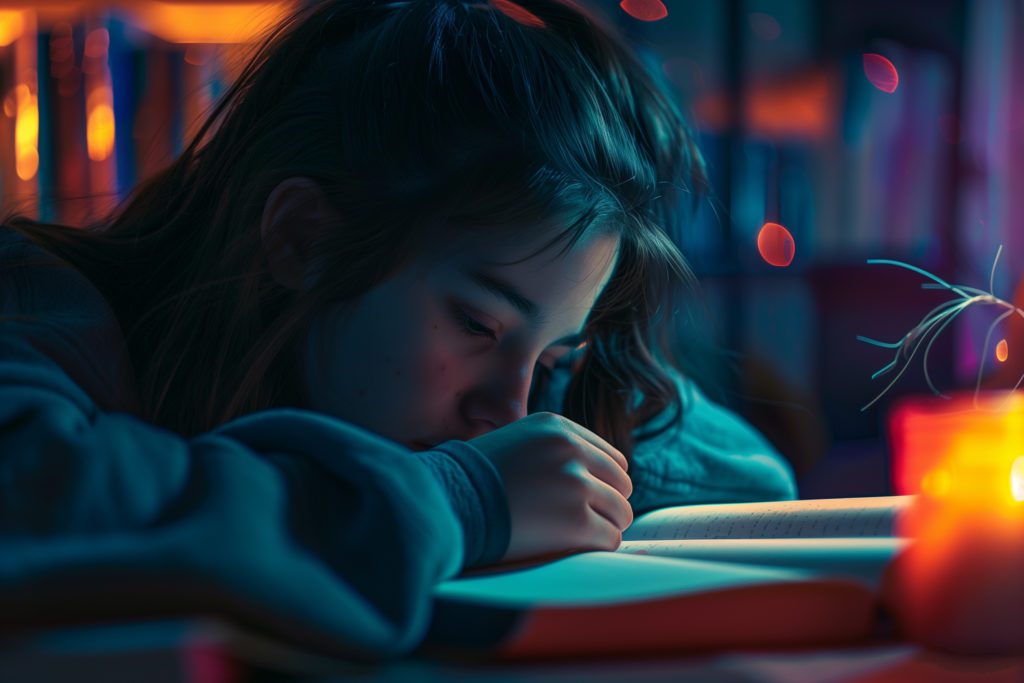
How Much Sleep do Teenagers Really Need?
Find out how much sleep teenagers really need to stay healthy, and get practical tips to keep their sleep schedule on track during weekends and holidays.

Discover a balanced teen sleep schedule for weekends and holidays
Notice your teen morphing into a creature of the night each holiday, ditching their early, school-night bedtime for endless episodes or hours of screen time? Pretty standard scenario. As holiday freedom kicks in, so do those later nights, often turning household routines upside down.
It's not just a question of reinforcing bedtime rules when school’s out—it’s important to tune into your teen's natural sleep rhythms during unstructured days. This article shares insights on healthy teenage sleep, tackling pressing questions like “how much sleep do teenagers really need?” and offering tips on maintaining a balanced teen sleep schedule, even without the early morning school bell.
How much sleep do teenagers need?
It’s no secret that teenagers often skimp on sleep, but the effects go beyond just feeling groggy the next morning. Adequate sleep—between 8 and 10 hours each night—is a cornerstone of physical and mental health, particularly during the teenage years when the body and brain are still developing.
Physiological impact
Think of sleep as your teen’s personal overnight repair shop. It's where the body pumps out growth hormones, essential for those teenage growth spurts. This rejuvenation station also gets to work on repairing muscles and synthesizing proteins—essentially prepping your teen for whatever the next day throws at them. It doesn’t stop there; a proper night’s sleep ensures their metabolism doesn’t get all wonky, keeping hunger hormones like ghrelin and leptin in check so last night’s pizza stays off the waistline.
Psychological impact
Sleep isn't just physical downtime—it's prime time for the brain to process the full download of daily drama. Less sleep? More mood swings and a quicker fuse, due to an overwhelmed brain struggling with unprocessed stress and emotions. The next day is like trying to run a marathon through a fog.
Enough sleep, on the other hand, keeps their memory sharp, their decisions sound, and their creative juices flowing. It’s key for helping them manage everything from exam stress to their burgeoning social lives.
Overall health
Zooming out, those all-nighters are more than just next-day nuisances—they set the stage for heavyweight health issues down the road, like cardiovascular disease and type 2 diabetes. Consistent, quality sleep keeps inflammation low, hearts ticking rhythmically, and blood sugar levels more stable. Encouraging your teen to hit those 8 to 10 hours of sleep can safeguard their health now and kickstart habits that'll keep them ticking over nicely into adulthood.
Grasping the crucial nature of sleep for your teen's growth means understanding why sticking to a regular sleep schedule matters—especially during holidays and weekends when routines tend to slide. Both teens and parents need to keep sleep on the priority list, right up there with all the fun stuff.
Common culprits for poor sleep during holidays
Have you pinpointed what makes sleep so elusive for your teen during school breaks? Here are just some of the real, tempting distractions and how they impact their precious slumber:
- Late-night gaming
Video games are a major culprit, with over 85% of teens in the US playing video games regularly, many extending their play into the early hours. Studies show that the intense stimulation from video games can delay sleep onset and reduce overall sleep quality. The bright screens and high engagement levels can trick the brain into a state of alertness that's hard to shake off when it’s finally time to hit the hay. - Social media scrolling
About 95% of teens have access to a smartphone, and 47% of them say they are online "almost constantly". This round-the-clock connectivity to social media platforms like Instagram, TikTok, and Snapchat can lead to significant sleep disruption. The blue light emitted by screens suppresses melatonin production, the sleep hormone, making it harder for teens to wind down and fall asleep at a reasonable hour. - Irregular social activities
Holidays and weekends often mean more time for parties, sleepovers, and late-night hangouts. While socializing is important for teen development, irregular social activities can lead to inconsistent sleep schedules, making it difficult for teens to maintain a healthy sleep pattern. This inconsistency is linked to a higher instance of adolescent substance use, depressive symptoms, and school truancy.
But fear not, it doesn’t have to come to that. While prying your teen away from their phones, video games, and social gatherings might seem like a Herculean task, there's a middle ground. Read on for practical tips that will help you strike a balance between good sleep and holiday fun.
How to create a healthy teen sleep schedule
Sticking to sleep schedules during holidays and weekends doesn't have to feel like Mission Impossible, even with the barrage of video games, late-night chats, and non-stop social media. Here’s how to keep your teen rested and ready for fun without messing up their sleep:
Smart screen shut-down
We all know screens are sleep stealers. Encourage your teen to shut down their gadgets at least an hour before bed. Maybe swap scrolling through phones for a bit of family time or a good old-fashioned book. Setting up a home charging station where everyone (yes, that includes you!) parks their devices at night can help make this a new normal.
Balance social life with sleep
Late-night hangs are cool, but regular late nights? Not so much. Chat with your teen about setting a reasonable curfew, especially on nights before active days. Encourage socializing earlier in the day—like catching a matinee movie or grabbing an early dinner with friends—so evenings stay calm and sleep-friendly.
Game over before bedtime
Gaming gets the adrenaline pumping, which is the opposite of what you want at bedtime. Set a gaming curfew—say, no Xbox or PlayStation an hour before the intended sleep time. This helps their brain shift from high alert to sleep mode.
Morning sunshine boost
Get them up and at ‘em with some morning sunlight. Whether it’s a quick walk, grabbing breakfast on the porch, or even just opening the blinds wide, natural light in the morning sharpens their body’s sense of day and night, helping normalize sleep patterns.
Cultivate a chill, pre-sleep routine
Encourage activities that help wind down the night. Maybe it’s some chill music, sketching, reading, or stretching—whatever chills them out. Keep it consistent to signal their body that it’s time to slow down and gear up for sleep.
Using tech to encourage better sleep
In a world where tech often keeps us up, let's flip the script—use it to improve sleep! Encourage your teen to download a sleep tracking app. These apps not only monitor sleep patterns but also provide insights into sleep quality, helping pinpoint what might be disrupting restful nights.
And why not turn good sleep into a friendly family competition? Everyone in the family could use the app to track their sleep for a month. Whoever consistently hits their sleep targets or shows the most improvement wins a reward—maybe a pick of the next family outing, or a pass from chores for a weekend.
Give some or all of the above tips a try, as these simple tweaks to your teen’s routine make a big difference, encouraging better sleep during the break!
Good sleep: Your teen’s ticket to thriving
As we wrap up, remember that consistent sleep schedules are a foundation for your teen’s well-being. Encouraging and participating in good sleep habits ensures your teen is well-rested and sets them up for success. In actively shaping these habits, you help guarantee that your teen returns from their school breaks rejuvenated and ready to conquer their world of challenges. Let’s make quality sleep a family priority, ensuring our teens are charged up for learning, growing, and excelling.

Written by
Georgia Austin
Professionally trained copywriter, editor, and content marketing strategist with over 7 years of experience—working with brands like Nike, Siemens, Toshiba, Tommy Hilfiger, Culture Trip, and Klook.
Download Pillow
Get help
Press & News
Legal
Connect
X (Twitter)
Company
Copyright © Neybox Digital Ltd.



